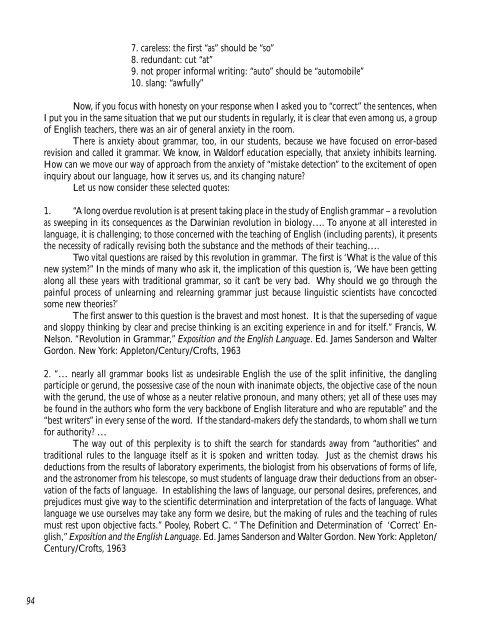Colloquium on English - Research Institute for Waldorf Education
Colloquium on English - Research Institute for Waldorf Education
Colloquium on English - Research Institute for Waldorf Education
You also want an ePaper? Increase the reach of your titles
YUMPU automatically turns print PDFs into web optimized ePapers that Google loves.
94<br />
7. careless: the first “as” should be “so”<br />
8. redundant: cut “at”<br />
9. not proper in<strong>for</strong>mal writing: “auto” should be “automobile”<br />
10. slang: “awfully”<br />
Now, if you focus with h<strong>on</strong>esty <strong>on</strong> your resp<strong>on</strong>se when I asked you to “correct” the sentences, when<br />
I put you in the same situati<strong>on</strong> that we put our students in regularly, it is clear that even am<strong>on</strong>g us, a group<br />
of <strong>English</strong> teachers, there was an air of general anxiety in the room.<br />
There is anxiety about grammar, too, in our students, because we have focused <strong>on</strong> error-based<br />
revisi<strong>on</strong> and called it grammar. We know, in <strong>Waldorf</strong> educati<strong>on</strong> especially, that anxiety inhibits learning.<br />
How can we move our way of approach from the anxiety of “mistake detecti<strong>on</strong>” to the excitement of open<br />
inquiry about our language, how it serves us, and its changing nature?<br />
Let us now c<strong>on</strong>sider these selected quotes:<br />
1. “A l<strong>on</strong>g overdue revoluti<strong>on</strong> is at present taking place in the study of <strong>English</strong> grammar – a revoluti<strong>on</strong><br />
as sweeping in its c<strong>on</strong>sequences as the Darwinian revoluti<strong>on</strong> in biology…. To any<strong>on</strong>e at all interested in<br />
language, it is challenging; to those c<strong>on</strong>cerned with the teaching of <strong>English</strong> (including parents), it presents<br />
the necessity of radically revising both the substance and the methods of their teaching….<br />
Two vital questi<strong>on</strong>s are raised by this revoluti<strong>on</strong> in grammar. The first is ‘What is the value of this<br />
new system?” In the minds of many who ask it, the implicati<strong>on</strong> of this questi<strong>on</strong> is, ‘We have been getting<br />
al<strong>on</strong>g all these years with traditi<strong>on</strong>al grammar, so it can’t be very bad. Why should we go through the<br />
painful process of unlearning and relearning grammar just because linguistic scientists have c<strong>on</strong>cocted<br />
some new theories?’<br />
The first answer to this questi<strong>on</strong> is the bravest and most h<strong>on</strong>est. It is that the superseding of vague<br />
and sloppy thinking by clear and precise thinking is an exciting experience in and <strong>for</strong> itself.” Francis, W.<br />
Nels<strong>on</strong>. “Revoluti<strong>on</strong> in Grammar,” Expositi<strong>on</strong> and the <strong>English</strong> Language. Ed. James Sanders<strong>on</strong> and Walter<br />
Gord<strong>on</strong>. New York: Applet<strong>on</strong>/Century/Crofts, 1963<br />
2. “… nearly all grammar books list as undesirable <strong>English</strong> the use of the split infinitive, the dangling<br />
participle or gerund, the possessive case of the noun with inanimate objects, the objective case of the noun<br />
with the gerund, the use of whose as a neuter relative pr<strong>on</strong>oun, and many others; yet all of these uses may<br />
be found in the authors who <strong>for</strong>m the very backb<strong>on</strong>e of <strong>English</strong> literature and who are reputable” and the<br />
“best writers” in every sense of the word. If the standard-makers defy the standards, to whom shall we turn<br />
<strong>for</strong> authority? …<br />
The way out of this perplexity is to shift the search <strong>for</strong> standards away from “authorities” and<br />
traditi<strong>on</strong>al rules to the language itself as it is spoken and written today. Just as the chemist draws his<br />
deducti<strong>on</strong>s from the results of laboratory experiments, the biologist from his observati<strong>on</strong>s of <strong>for</strong>ms of life,<br />
and the astr<strong>on</strong>omer from his telescope, so must students of language draw their deducti<strong>on</strong>s from an observati<strong>on</strong><br />
of the facts of language. In establishing the laws of language, our pers<strong>on</strong>al desires, preferences, and<br />
prejudices must give way to the scientific determinati<strong>on</strong> and interpretati<strong>on</strong> of the facts of language. What<br />
language we use ourselves may take any <strong>for</strong>m we desire, but the making of rules and the teaching of rules<br />
must rest up<strong>on</strong> objective facts.” Pooley, Robert C. “ The Definiti<strong>on</strong> and Determinati<strong>on</strong> of ‘Correct’ <strong>English</strong>,”<br />
Expositi<strong>on</strong> and the <strong>English</strong> Language. Ed. James Sanders<strong>on</strong> and Walter Gord<strong>on</strong>. New York: Applet<strong>on</strong>/<br />
Century/Crofts, 1963

















